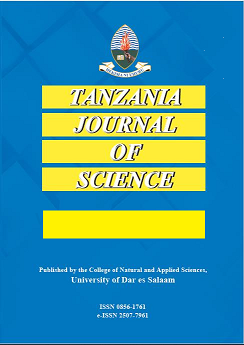Spatial-temporal variation in sex ratio and group size of ostriches (Struthio namelus) in the Serengeti National Park and environs in Northern Tanzania
Keywords:
group size, ostrich, Serengeti, sex ratio, Struthio camelusAbstract
A study was conducted on variation in sex ratio and group size of ostriches (Struthio camelus) in Serengeti National Park and adjacent partially protected areas in northern Tanzania. Data were collected for two years (2005- 2006), along 388 km of roads. The two areas were compared with respect to ostrich sex ratio (male: female) and group size. Seasonal variation of these variables (sex ratio and group size) was also determined. Repetitive sampling showed an overall femaleskewed sex ratio, which was significantly different from unity. The sex ratio inside the National Park was also significantly skewed towards females, whereas that in the partially protected areas was skewed in favour of the males. There was a significant difference in sex ratios between the two areas (Chi square: !2 = 48.041, DF = 2, p<0.001). The grand median group size was 3 birds and the same median group size was obtained both in the National Park and partially protected areas, and there was no significant difference in group sizes between the areas (Median test: !2 = 1.861, DF = 1, p = 0.173) although bigger groups were observed in the park than in the partially protected areas. In addition, there was a tendency for ostriches to form significantly larger groups in the wet season than dry season in both areas (p<0.05). Natural predators of ostrich were found to be significantly higher inside the National Park than outside it (p<0.05). The presence of natural predators and seasonal variations may have influenced the present results.
Keywords: group size, ostrich, Serengeti, sex ratio, Struthio camelus


